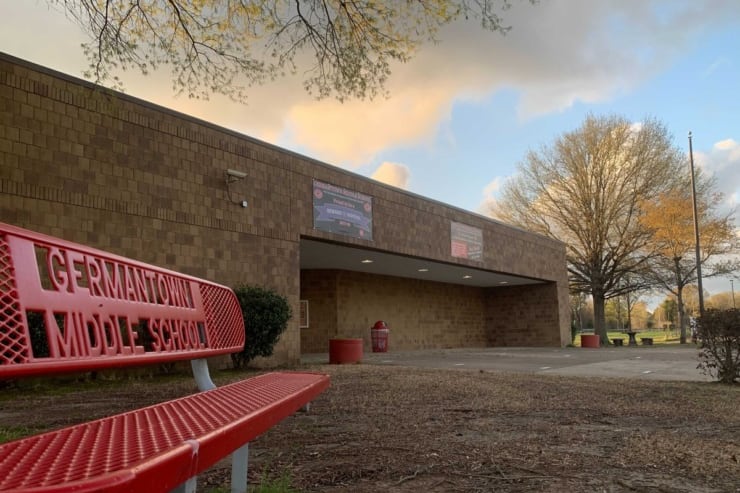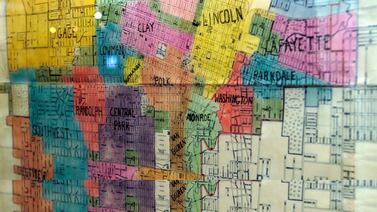Memphis school officials are promising a legal challenge if Tennessee tries to force them to cede three schools to an affluent suburban district in Germantown.
Two legislative committees this week passed legislation to require Memphis-Shelby County Schools to sell or transfer the valuable properties without guarantees of what would happen to their future students zoned for those schools.
“My client’s not afraid to go to the courthouse, and that’s where they’ll be headed” if the bill becomes law, said Tony Thompson, lobbyist for the Memphis district, during testimony Tuesday before a House education panel.
“It’s about land for them, it’s about kids for us,” he added.
The legislation, pushed by the town of Germantown, is the latest development in an ongoing dispute over schools operated by the Memphis district in several suburban towns that created their own school systems after Memphis and Shelby County school systems merged in 2013.
At issue are Germantown elementary, middle and high schools — known locally as the “three Gs” — which are operated by Memphis-Shelby County Schools under the terms of a 2013 legal settlement reached with the town of Germantown in federal court. Most students zoned to the schools live in unincorporated areas near Germantown, just outside of the suburb.
Memphis leaders have said there are undertones of race and class in the tug-of-war. Most students at the three Germantown schools are Black, and about a third are considered economically disadvantaged. Most students attending schools in the Germantown municipal district are white, and about 5% come from low-income families.
But Rep. Mark White, a white Shelby County Republican whose district includes Germantown, said the issue is local control.
“These school buildings are in the municipality of Germantown. All they’re asking for is to be able to manage and operate these schools,” said White, who is co-sponsoring the bill with Germantown Republican Sen. Brian Kelsey.
Last year, White agreed to back off from similar legislation if all parties resumed negotiations that had broken off several years earlier. Leaders from the Memphis district and the town of Germantown have since met 13 times but failed to reach an agreement.
This year’s bill, which would take effect on July 1, 2023, says a county district cannot operate a school within the geographic boundaries of a municipal district. It essentially would require Memphis-Shelby County Schools to transfer the properties to Germantown’s district, which would pay fair market value for the land, but not for the aging buildings.
White said the 3,300 students currently attending the three schools would be allowed to complete their education on those campuses under a lease agreement with Memphis-Shelby County Schools. But he could not promise the schools would be available for future students zoned to attend them, which Thompson said is the issue.
“Out of 3,300 or so students, we think we can absorb the elementary school kids and middle school kids, but we need a new high school,” Thompson said. “Properties appraise right now for $25 to $30 million for all three. It costs about $70 million to $90 million to build a high school.”
Thompson added: “I have no authority to settle this, but if they offered us enough money to build a high school and the time to build it, I would imagine we wouldn’t be here.”
The bill says the properties “must be used for educational purposes” but also says the land can be sold if it’s “in the community’s best interest.” If sold, the net proceeds would be split between the two districts.
On Wednesday, Germantown Mayor Mike Palazzolo testified before the Senate Education Committee that his community has no immediate plans to tear down buildings or sell the properties.
“We would use it for K-12 educational purposes,” Palazzolo said. “Our growth patterns show 15 to 20 years from now, we’ll need additional land and campuses. I would envision that since these buildings were built between 1959 and 1980, that in 20 years from now — even with the tremendous amount of deferred maintenance on the buildings — we would tear down a campus or two to build a campus or two.”
At a January presentation to Germantown’s school board, a demographic researcher projected stagnant student enrollment in the town for the next decade.
Kevin Woods, a Memphis school board member who participated in the negotiations, said he supports litigation if necessary.
“We will do everything in our power to continue to protect the interest of those families and employees currently attending 3G schools,” Woods told Chalkbeat. “We know the law is on our side.”
You can track the bill here.
Marta W. Aldrich is a senior correspondent and covers the statehouse for Chalkbeat Tennessee. Contact her at maldrich@chalkbeat.org.








